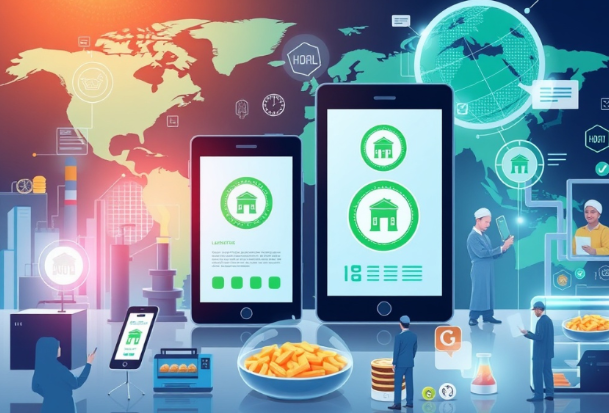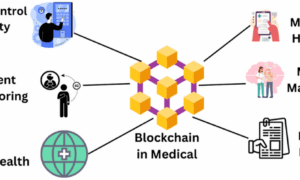The Digital Revolution in Halal Food Standards
The global halal food market is experiencing unprecedented growth, projected to reach nearly $3 trillion by 2030. This expansion reflects not just the needs of 1.8 billion Muslim consumers worldwide, but also the growing recognition of halal standards as markers of quality, safety, and ethical food production. However, this explosive growth has exposed critical weaknesses in traditional certification systems that rely heavily on manual processes, paper documentation, and periodic physical audits.
For decades, halal certification has been a labor-intensive process involving manual inspections, mountains of paperwork, and certifiers who must physically verify every step of the supply chain. This approach, while thorough in principle, creates bottlenecks that slow down global trade, increase costs, and leave room for human error and even fraud. As consumer awareness increases and regulatory requirements tighten across borders, the food industry faces mounting pressure to modernize.
Technology is now stepping in to transform this landscape completely. From artificial intelligence that can analyze thousands of ingredient documents in seconds to blockchain systems that create unchangeable records of every step in the food supply chain, digital innovation is making halal certification faster, more accurate, and more trustworthy than ever before.
The Critical Problems with Manual Certification Systems
Traditional halal certification processes face several significant challenges that technology aims to address. Manual audits require certification bodies to send inspectors to manufacturing facilities, slaughterhouses, and processing plants. These visits are time-consuming and expensive, often taking weeks or months to schedule and complete. For companies operating across multiple countries, coordinating these inspections becomes a logistical nightmare.
The documentation burden is equally problematic. Companies must maintain extensive paper records proving that ingredients, processing equipment, storage facilities, and transportation methods all meet halal standards. Verifying these documents manually is slow and prone to oversight. A single missing certificate for an ingredient supplier can halt the entire certification process.
Supply chain transparency remains one of the biggest obstacles. Modern food products often contain dozens of ingredients sourced from multiple countries. Tracing each component back to its origin to verify halal compliance is extraordinarily difficult with paper-based systems. This lack of visibility creates opportunities for contamination, whether accidental or intentional.
Perhaps most concerning is the issue of fraud and mislabeling. The halal food market’s rapid growth has unfortunately attracted bad actors who exploit the system’s weaknesses. Counterfeit halal certificates, mislabeled products, and false claims damage consumer trust and harm legitimate businesses. Without robust verification systems, distinguishing authentic halal products from fraudulent ones becomes nearly impossible for both regulators and consumers.
How Technology Solves These Challenges
Artificial intelligence is revolutionizing the documentation review process that forms the foundation of halal certification. AI-powered systems can analyze ingredient lists, supplier certificates, and processing documentation in minutes rather than days. These systems are trained to recognize non-halal ingredients, identify missing certifications, and flag potential compliance issues automatically. For example, when a food manufacturer submits their product formulation, AI algorithms can instantly cross-reference every ingredient against comprehensive halal ingredient databases, highlighting any concerns for human auditors to review.
Machine learning systems are also being deployed for visual verification. Computer vision technology can analyze images and videos from production facilities to ensure halal compliance practices are being followed. This includes verifying proper separation between halal and non-halal production lines, checking equipment cleaning procedures, and even monitoring animal welfare standards at slaughterhouses.
Blockchain technology addresses the supply chain transparency problem head-on. By creating immutable digital ledgers that record every transaction and movement of food products from farm to table, blockchain makes it virtually impossible to tamper with certification records. When a chicken is slaughtered according to halal standards, that information is recorded on the blockchain. As the meat moves through processing, packaging, distribution, and retail, each step is documented with timestamps and verification codes. Anyone in the supply chain, from regulators to end consumers, can trace the product’s entire journey and verify its halal status.
Digital certification platforms are streamlining the entire approval process. Cloud-based systems allow food companies to submit applications, upload documentation, schedule audits, and receive certificates entirely online. These platforms integrate with ingredient databases, supplier networks, and certification body systems to automate much of the verification work. What once took months can now be completed in weeks or even days.
Consumer-facing technology is equally important. QR codes printed on product packaging now allow shoppers to instantly verify halal certification using their smartphones. Scanning the code connects them to secure databases that display the product’s certification details, the certifying body’s credentials, and even the complete supply chain information. This level of transparency was unimaginable just a few years ago.
Internet of Things sensors are being deployed throughout the supply chain to monitor conditions that could affect halal compliance. Temperature sensors ensure cold chain integrity, GPS trackers prevent unauthorized stops during transportation, and smart seals detect if packaging has been tampered with. All this data feeds into centralized monitoring systems that alert companies and certifiers to potential compliance issues in real time.
Benefits for Food Companies
The business case for adopting digital halal certification technologies is compelling. Companies report dramatic reductions in certification timelines, with some achieving approval in half the time previously required. This speed-to-market advantage is crucial in the competitive food industry where product launches must align with marketing campaigns and seasonal demand.
Cost savings are substantial. While the initial investment in digital systems requires capital, the ongoing savings from reduced paperwork, fewer physical audits, and automated compliance monitoring quickly offset these costs. Companies no longer need to maintain large teams dedicated solely to managing certification documentation. Remote audits conducted via video conferencing and digital document review reduce travel expenses for both companies and certifiers.
Access to global markets becomes significantly easier with digital certification systems. Many countries are modernizing their import regulations to accept digital halal certificates, eliminating delays caused by paper document verification at borders. Food exporters can now serve customers worldwide with greater confidence that their digital certifications will be recognized and accepted.
Consumer trust receives a major boost from technology-enabled transparency. When customers can scan a product and see complete supply chain information, their confidence in the halal claim increases dramatically. This trust translates directly into brand loyalty and willingness to pay premium prices for certified products.
Traceability improvements help companies respond faster to potential issues. If a contamination problem is discovered, blockchain-based systems can identify exactly which batches are affected and where they’ve been distributed within hours instead of days. This capability not only protects consumers but also minimizes financial losses from overly broad product recalls.
Global Impact and Adoption
The transformation is happening worldwide, though adoption rates vary by region. Middle Eastern countries, home to many of the world’s leading halal certification bodies, are pioneering digital systems. The UAE and Saudi Arabia have launched national digital halal certification platforms that integrate with customs systems to streamline imports of certified products.
Europe is rapidly modernizing its approach to halal food certification as Muslim populations grow and demand for certified products increases. Several European certification bodies now offer fully digital application and verification processes. The European Union is also exploring standardized digital certification frameworks that could simplify trade across member states.
In the United States, technology adoption is driven by food companies seeking to tap into the lucrative halal market. American manufacturers are increasingly partnering with tech-enabled certification bodies that can provide rapid, verifiable halal credentials for domestic and export markets.
Southeast Asian countries, particularly Malaysia and Indonesia, are leveraging their position as both major halal food producers and large Muslim markets to develop sophisticated digital certification ecosystems. Malaysia’s JAKIM certification body is internationally recognized for its rigorous standards and is at the forefront of digital innovation.
Governments worldwide are recognizing that digital halal compliance systems offer benefits beyond food safety. These technologies support economic development by making it easier for local producers to access global markets, reduce corruption opportunities through transparent automated systems, and provide regulators with better oversight tools.
Future Trends Reshaping the Industry
The next wave of innovation will make today’s systems look primitive by comparison. Fully autonomous AI-driven audits are on the horizon, where artificial intelligence systems conduct comprehensive compliance reviews with minimal human intervention. These systems will combine document analysis, video monitoring, sensor data, and predictive algorithms to provide continuous certification rather than periodic renewals.
National and international digital halal certification portals are being developed to create unified global standards. These platforms will allow a product certified in one country to be automatically recognized worldwide, eliminating redundant certification processes and dramatically reducing trade barriers.
Real-time supply chain monitoring will become standard practice. Every stakeholder, from ingredient suppliers to retailers, will have access to live dashboards showing the halal compliance status of products at every stage. Automated alerts will notify relevant parties immediately if any compliance issue arises, allowing for instant corrective action.
Smart packaging integrated with halal verification technology represents the future of consumer interaction with certified products. Imagine packaging that changes color if temperature fluctuations compromise halal integrity, or labels that display real-time freshness indicators alongside certification information. Near-field communication chips embedded in packaging will provide even richer information than today’s QR codes, including video content from production facilities and detailed ingredient sourcing data.
Satellite technology and drone surveillance may soon play roles in verifying compliance at remote farms and facilities, providing auditors with unprecedented visibility into operations without requiring physical presence.
Conclusion
Technology is fundamentally transforming halal certification from a slow, paper-intensive process into a fast, transparent, and globally trusted system. Artificial intelligence accelerates documentation review, blockchain creates tamper-proof supply chain records, digital platforms streamline certification workflows, and consumer-facing tools provide unprecedented transparency. These innovations benefit everyone in the halal food ecosystem: food companies gain efficiency and market access, certification bodies improve accuracy and reach, regulators receive better oversight tools, and consumers enjoy greater confidence in the products they purchase.
As the global halal market continues its remarkable growth, technology will not just support this expansion—it will enable it. The future of halal certification is digital, and that future is arriving faster than most people realize. Companies that embrace these technologies today position themselves as leaders in tomorrow’s global halal food industry, while those that cling to manual processes risk being left behind in an increasingly connected and transparent marketplace.



































